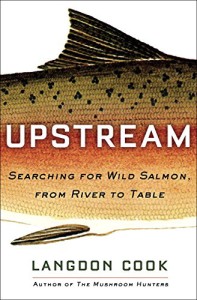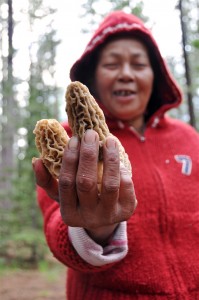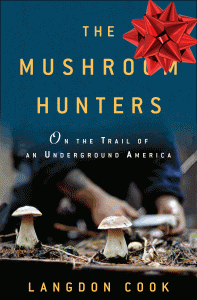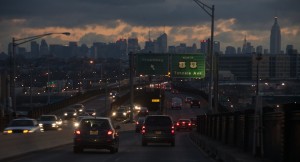 Dear Readers, I’d like to share The Wall Street Journal‘s review of Upstream with you in full as it isn’t available online without a subscription. The review, by David Profumo, appeared in the weekend edition, June 24.
Dear Readers, I’d like to share The Wall Street Journal‘s review of Upstream with you in full as it isn’t available online without a subscription. The review, by David Profumo, appeared in the weekend edition, June 24.
* * *
Chinook, sockeye, coho, chum, humpback, steelhead—they sound like a lineup of heavy metal bands, but these are all species of the Pacific salmon genus Oncorhynchus, a charismatic tribe of silvery migrants once so prolific that they were used for fertilizer and dog food but are now, in places, so embattled that some fragile populations face extinction. In the words of Langdon Cook, author of this invigorating book, “They’re dissolving into fable.”
At the heart of “Upstream” is a journey—the oldest shape in literature. It follows the precarious odyssey of these fish that are born in freshwater streams, swim down to feed and mature in the ocean, then run up again to spawn just once, and die. This is known as anadromy (eels, which do the reverse, are catadromous), and salmon’s dramatic life story has captivated the imagination of many peoples in the Northern Hemisphere, eliciting wonder at the salmon’s powers of endurance and giving rise to fluvial myths and seasonal ceremonies that persist even though the heyday of great abundance is largely gone.
In tracing the history and life cycle of these iconic creatures, Mr. Cook embarks on a series of his own journeys—14 nicely episodic chapters that explore how and where such fish still survive in the modern world, despite the threats of logging, dams, the diversion of running water for domestic and commercial uses, overfishing, and climate change. It is a saga that has been told before but seldom with such immediacy and panache.
“Upstream” covers a lot of ground. We begin in a high-end Seattle restaurant, where the season’s first, greatly prized king salmon are being prepared for table. They hail from Alaska’s Copper River, where the annual catch is carefully monitored, but elsewhere the situation is becoming dire. Along the Columbia River in Washington, “harnessed for power” by the Grand Coulee Dam, 1,200 miles of spawning grounds were closed off and a 10,000-year-old tribal havesting spot obliterated back in 1957. Today the salmon runs on the Columbia are augmented by hatchery fish, pale imitations (“an illusion that everything is okay,” in Mr. Cook’s words), but if you want the real thing, you will have to buy it beneath the Bridge of the Gods, from Native American netsmen who are the only people licensed to catch wild chinook there—a source of continuing controversy.
As he visits other waterways that have similarly become part of engineered landscapes—the Golden State’s Sacramento River is “on life support,” the Snake River in Oregon and Idaho has been “handcuffed” by dams and is thronged with newly prolific predators—the author encounters a spirited cast of characters that includes foodies, eco-warriors, sport anglers, local bureaucrats and zealots of every stripe, all of them passionate and often at loggerheads with one another over the use of fresh water, the lifeblood of every region. From the remote gill-netting community of Cordova, Alaska, to British Columbia’s fabled Kispiox River, “Upstream” charts numerous conflicting attitudes toward the sharing of natural resources.
Even the existence of hatcheries is contentious. In a lively chapter titled “The Ballad of Lonesome Larry,” Mr. Cook describes the painstaking efforts of scientists at Idaho’s Eagle Fish Hatchery to sustain a sockeye run that has to migrate 900 freshwater miles and surmount eight hydroelectric dams. This certainly appears a heroic undertaking by all concerned, but some purists regard reared salmon as “zombies” and “clones” that merely dilute the gene pool when funds would be better applied to habitat preservation in the “strongholds” where wild populations are hanging on. There seems to be precious little agreement.
Throughout these sorties, Mr. Cook is a congenial and intrepid companion, happily hiking into hinterlands and snorkeling in headwaters. Along the way we learn about filleting techniques, native cooking methods and self-pollinating almond trees, and his continual curiosity ensures that the narrative unfurls gradually, like a long spey cast. One arresting example is his description of the reef-netters on Lummi Island, in the Puget Sound. Here entrepreneur Riley Starks has revived a traditional practice of luring sockeye salmon down an avenue of ropes and colored ribbons to the waiting net, where they are individually handled, thus avoiding any wasteful bycatch. The fish taste better, too, because they are “untainted by a stressful death,” whereas salmon caught with gill nets “might spend hours, or maybe even an entire night . . . hanging dead in the net.” There are now fewer than 100 reef-netters working anywhere, none of them Indian. “Upstream” may bristle with fins, but the human factor is a crucial aspect of each journey.
As well as being a gastronome and a naturalist, Mr. Cook is a passionate angler. Homo piscatorius tends to see the aquatic world with a sportsman’s peculiar intensity, and he is good on the beauty and “otherness” of his elusive quarry. On Washington State’s Drano Lake, he drags plug baits and cranks in a hatchery-bred 12-pounder; from a secret “honey-hole” in Oregon, he lands a fine 20-pound king salmon with guide extraordinaire Guido Rahr. In the penultimate chapter (“Herding the Pinks”), he joins a flotilla of die-hard aficionados on Labor Day fishing Seattle’s industrialized Duwamish River in pursuit of the often despised little “humpies,” or pink salmon, despite the trash compactors and barge traffic. (This type of urban angling is becoming a global cult: In April, I was fly-casting to catfish just upstream of the Ponte Vecchio in downtown Florence.) The chapter ends with a kid triumphantly yelling, “I’ve got one”—a phrase, as Mr. Cook says, “as old as language itself.”
With a pedigree that includes Mark Kurlansky, John McPhee and Roderick Haig-Brown, Mr. Cook’s style is suitably fluent, an occasional phrase flashing like a flank in the current. One stream is described as sauntering languidly, like “an elderly flâneur out for a morning constitutional”; a spawning king has “pectoral fins working like frayed Chinese fans.” For all its rehearsal of the perils and vicissitudes facing Pacific salmon, “Upstream” remains a celebration. Given half a chance, nature is resilient, like a thistle muscling up through tarmac. This is not a work of eco-worship, but early on in his book Mr. Cook observes, “Our planet, the only one known to have life on it, is nothing short of a miracle.” Could we please have that entered in the minutes?
—Mr. Profumo is the fishing correspondent for Country Life magazine in the U.K.
Like this:
Like Loading...
 RECENTLY I HAD the pleasure of talking with Jason Rolfe, a writer and fishing guide who uses fly-fishing as the put-in to navigate an ever-changing stream of words, art, and ideas through a variety of mediums. In addition to guiding and taking shifts at my local flyshop, Emerald Water Anglers in West Seattle, Jason operates the Syzygy Fly Fishing web site, runs a podcast called The Fly Tapes, and is the impresario behind Writers on the Fly, a traveling reading series that combines tales inspired by fly-fishing with visual art, music, conservation, and beer (not necessarily in that order).
RECENTLY I HAD the pleasure of talking with Jason Rolfe, a writer and fishing guide who uses fly-fishing as the put-in to navigate an ever-changing stream of words, art, and ideas through a variety of mediums. In addition to guiding and taking shifts at my local flyshop, Emerald Water Anglers in West Seattle, Jason operates the Syzygy Fly Fishing web site, runs a podcast called The Fly Tapes, and is the impresario behind Writers on the Fly, a traveling reading series that combines tales inspired by fly-fishing with visual art, music, conservation, and beer (not necessarily in that order).
 Dear Readers, I’d like to share The Wall Street Journal‘s
Dear Readers, I’d like to share The Wall Street Journal‘s  My new book,
My new book, 








